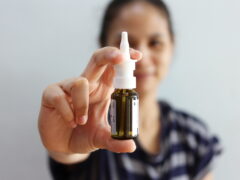What is tuberculosis?
Tuberculosis, also called TB, is an infection caused by bacteria. Tuberculosis usually affects the lungs. But it can also affect other parts of the body. This could include the joints, kidneys, spine, and brain.
There are 2 types of TB:
- Latent or Inactive TB:The bacteria are present in your body but aren’t making you sick or contagious. Your immune system is protecting your body from the bacteria. You aren’t able to spread the disease.
- Active TB:The bacteria are present and are causing symptoms. Your immune system wasn’t able to fight them. You may be able to spread the disease.
If it isn’t treated properly, TB can be fatal.
Symptoms of tuberculosis
Your symptoms will depend on what area of your body is affected. Usually TB affects the lungs. The symptoms of active TB in the lungs include:
- Bad cough that lasts 3 weeks or longer
- Coughing up blood or sputum (mucus from deep inside the lungs)
- Chest pain
- Fever
- Fatigue
- Loss of appetite
- Unintended weight loss
- Chills
- Night sweats
If TB affects your joints, you may develop pain that feels like arthritis. If TB affects your bladder, it may hurt to go to the bathroom and there may be blood in your urine. TB of the spine can cause back pain and leg paralysis. TB of the brain can cause headaches and nausea.
Healthy people are often able to fight off the infection. They usually don’t develop active TB but the bacteria are dormant (inactive) in their lungs. If your body isn’t able to contain the infection and the bacteria continue to grow, active TB can develop. This can happen years after you’re infected. It usually happens when something causes your immune system to weaken. Most of the time, you’ll have symptoms if you have active TB. But sometimes people have active TB and don’t know it.
What causes tuberculosis?
TB is caused by bacteria. The bacteria spread through the air from one person to another. The bacteria enter the air when a person with active TB in the throat or lungs talks, laughs, sneezes, or coughs. Anyone who is nearby can then breathe in that air and breathe in the bacteria. Then they become infected.
TB bacteria is spread only through the air. You can’t get TB by:
- Shaking someone’s hand
- Sharing food or drink
- Sharing toothbrushes
- Touching something an infected person has touched
Once you breathe in the bacteria, they settle in your lungs and begin to grow. Sometimes the bacteria move from the lungs to other areas of the body. This could include the kidneys, spine, and brain.
When you have an active infection in your lungs or throat, you’re contagious. This means you can spread the disease to other people. When the disease is in other parts of your body, and not your lungs or throat, you’re usually not able to spread it.
It’s not easy to get tuberculosis. Usually, you have to be in close contact with someone who has active TB. You need to be around them for an extended period of time. TB tends to be spread between family members, close friends, and people who live or work together.
If you do get infected, you’re at higher risk of developing active TB disease if you have a weakened immune system. This could include:
How is tuberculosis diagnosed?
The most commonly used method to check for tuberculosis is a skin test. Blood tests can also be used. If you have a positive skin test or blood test, it means you have been exposed to a person who has tuberculosis. You have been infected with the bacteria that cause the disease. The test doesn’t tell you if you have a latent TB infection or if you have active TB disease.
If your skin test is positive, you will likely have a chest X-ray and a physical exam. This will tell your doctor which kind of TB you have. Usually, a person can be infected with the bacteria that cause TB but not actually have active tuberculosis. Of the people who are infected with the bacteria, only a few (about 10%) go on to develop active TB.
Can tuberculosis be prevented or avoided?
The best way to prevent getting a tuberculosis infection is to avoid being in close contact with a person who has active TB disease.
There is a vaccine against tuberculosis. It’s used in countries where TB is common. It’s not often used in the United States because the chances of being infected with TB are low.
Tuberculosis treatment
Tuberculosis is treated with antibiotic medicine. The medicine(s) your doctor recommends will depend on many factors. These include your age, your health, whether your TB is active or latent, and whether your TB is drug resistant. This means that certain medicines won’t work on it.
You will need to take your TB medicine(s) for 6-9 months. Your doctor will tell you exactly how and when to take your medicine, and for how long. It is very important that you follow your doctor’s instructions carefully. Take your medicine at the same time every day. Don’t skip doses or stop taking your medicine. This could make your TB harder to treat.
If you’re infected with TB but don’t have active TB, you can take medicine to prevent the disease from developing. This is called preventive therapy. If you follow your doctor’s instructions carefully, you won’t develop TB disease.
What medicines are used to treat tuberculosis?
Common medicines used to treat tuberculosis include:
- Isoniazid
- Rifampin
- Ethambutol
- Pyrazinamide
Depending on your doctor’s recommendations, you may take 1 or more of these medicines. These medicines don’t usually cause side effects. However, TB drugs can damage your liver.
Don’t drink alcohol or take acetaminophen (one brand name: Tylenol) while taking TB medicines. Alcohol and acetaminophen can increase the risk of liver problems. Always check with your doctor before you take any other medicine. Some medicines interact with TB medicines and can cause side effects.
While taking these medicines, your doctor may want to monitor you every month. For example, you may need to visit your doctor for tests, to get another prescription, and to check for any side effects or problems.
Although side effects from tuberculosis medicine aren’t common, they can be serious. Call your doctor immediately if you have any of these symptoms:
- Nausea
- Vomiting
- Abdominal pain, tenderness or soreness
- Blurry vision or color-blindness
- Dark (coffee-colored) urine
- Fever that lasts 3 days or longer
- Jaundice (the yellowing of the skin and the whites of the eyes)
Living with tuberculosis
If you have active TB disease, it will take several weeks of treatment before you are no longer contagious. Until then, it’s important to take steps so you don’t spread the bacteria.
- Follow your doctor’s instructions for taking your medicine.
- Cover your mouth and nose with a tissue any time you cough, sneeze, or laugh. Put the tissue in a closed bag before you throw it away.
- Avoid close contact with other people.
- Sleep in a bedroom by yourself. Air out the room often so the bacteria don’t stay in the room.
- Stay home from work or school until your doctor says it’s okay to return.
If you develop active TB disease, you may need to be monitored medically for the rest of your life. This could include regular checkups and probably chest X-rays. This is done to make sure you stay free of TB disease, even after you have taken the full course of TB medicine.




